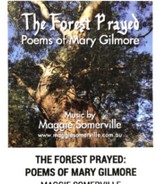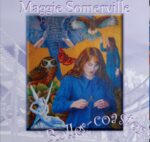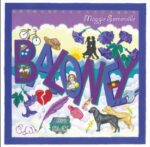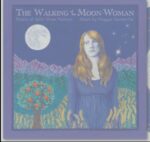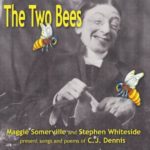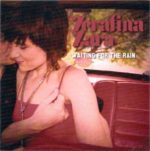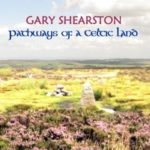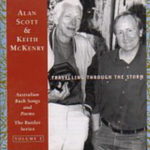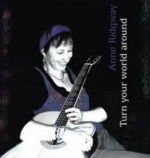Description
I am delighted, and relieved, to announce that I have finally completed my new album, ‘The Forest Prayed’, of poems by Dame Mary Gilmore which I have set to music over the last few years and now recorded.
It has been a marathon effort recording this album, with many trips up the mountain to the beautiful studio in Kalorama, much liaising with various instrumentalists, and stressful emails about copyright issues with the owner of Mary Gilmore’s estate as well as with the Dobell Foundation (about the use of Dobell’s famous portrait of the poet).
My son’s tragic death just as I completed the album has now led to my dedication of the album to him, especially as his graphic artwork appears on both the CD cover and the booklet. I like to think that he would be very happy to see this album finished and about to be launched, as I so often played him different tracks and sought his feedback, which was always positive and supportive.

In our ever-changing world of technology, I was worried I would have to deal with tiny USB sticks for my new album, but I’ve now discovered that, with CD players now becoming rapidly extinct in cars and elsewhere, we have a new phenomenon – the download card. At least this has the advantage over a USB stick of having a visible title, image and website on it. So I have now organised the album as a CD with a download card inside, protected by shrink wrap – a full package for $20 each.
My first launch was on Saturday 6th April, 4-6 pm in the Memorial Hall, Dennison Street, Crookwell, New South Wales – near where Mary Gilmore was born. It was hosted by the Upper Lachlan Shire Mary Gilmore Society and launched by Ms Louise Taylor, wife of local member, Angus Taylor. I have also organised a major launch in Melbourne, at Federation Room, Maroondah Federation Estate in Ringwood, on Saturday 27th July, from 2pm to 5pm. There may be other launches, to be announced.
Despite being on our past and current $10 note and being made a Dame for her services to Australian literature, Mary Gilmore has, I believe, been long overlooked. The works of both her contemporaries, Banjo Paterson and Henry Lawson, are extremely famous and strongly promoted musically although neither was made a knight. Is this because they were men and Mary Gilmore a woman? I believe so, and feel that it is now time for the balance to be redressed and for Gilmore’s literary talents to be more widely publicised and promoted just as Paterson’s and Lawson’s have been down the years by various musicians. I am proud to be the first person to put together a full album of this talented woman’s works and to hopefully help to immortalize her poetry in Australia and beyond.
in Trad&Now (Issue 136) – by Chris Spencer
30 March, 2020
 On this album, Maggie Somerville has set 16 poems, written by Dame Mary Gilmore, to music.
On this album, Maggie Somerville has set 16 poems, written by Dame Mary Gilmore, to music.
While I was aware of Gilmore, being pictured on our $10 note, I wasn’t fully educated about her work and influence on the literary scene.
After doing some research about Gilmore, I discovered that she is regarded as an Australian patriot, feminist, social crusader and folklorist.
Other things I learned were that she and Henry Lawson may have considered marriage, she went to Paraguay with William Lane’s new settlers, and her best work is considered among the best written by any Australian poet.
Readers are encouraged to do some of their own research.
I found her entry in the Australian Dictionary of Biography very illuminating.
I wonder how Somerville made her selection of poems considering the large volume of work created by Gilmore.
In this review, I will concentrate on the music rather than the lyrics of Gilmore’s poems.
Somerville has selected a range of themes that concerned Gilmore, as well as poems are written from different eras.
The earliest was written in 1916, the latest in 1947.
The themes include drought, poor treatment of migrants, aborigines, war, fellow poets (Lawson and Shaw Neilson), and the role of women.
Maggie has assembled a marvellous array of musicians to help her bring the poems to life.
If I have one criticism, it is that some songs are similar in tempo.
However, the arrangements with the use of a variety of instruments assist in giving each song a different sound.
Another aspect I enjoyed was the range of instruments used in the recording: tin whistle, banjo, mandolin, violin, viola, ukulele, cello, harmonica, didgeridoo, concertina, harp and keyboards.
These were played by Somerville herself, Catherine Leslie, Sam Lemann, Jenny Rowlands, Rob Fairbairn, Ray Simpson, Helmut Lopaczuk and David Billings.
Here are some observations of several tracks I made while listening to the album several times.
“I Heard a Thrush in a Tree Today” has a tweeting thrush intro, delicate violin accompaniment, and an all too brief all male chorus.
“The Forest Prayed” is piano based with a ‘solo’ on the saw by Ray Simpson!
The saw makes another appearance on “Truganini”.
Whistling accompanies the jaunty “The Whistling Man”, while on “Never Admit the Pain”, Somerville has chosen to only include 8 lines of the full poem.
She also asks a male to recite the first stanza and then concludes the 2nd with a full sounding choir.
Perhaps the highlight of the album for me is “No Foe Shall Gather Our Harvest”, which includes an excerpt of the then Prime Minister John Curtin’s speech, which adds to the poem’s patriotism and call to arms.
In contrast is “And We All Joined Up”, which, while having a similar theme to “No Foe…”, has a very light hearted arrangement using a jaw harp.
Another distinctive song is “I Wish t I Was Unwed Again”, which takes a look at the lot of a housewife.
I’m not sure if Gilmore intended the poem to be humorous.
The album finishes with the anti-war song, “War”.
In summary, this album is unusual in its approach, although not unlike John Schumann’s and Hugh McDonald’s recording albums of the poems of Henry Lawson.
However, there is much to like, its folksiness,
